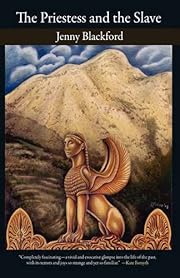

Klik op een omslag om naar Google Boeken te gaan.
|
Bezig met laden... The Priestess and the Slavedoor Jenny Blackford
Geen Bezig met laden...
Meld je aan bij LibraryThing om erachter te komen of je dit boek goed zult vinden. Op dit moment geen Discussie gesprekken over dit boek. Review by Stuart Mayne This is a beautifully written short novel that follows two separate lives in fifth century Greece. The stories are vignettes of a turbulent time in Attic politics rather than parts of a unified plot line. This does not distract from the tension and drama of each story until the finale of the novel where the reader is waiting for something to happen. Unfortunately, the story ends without dramatic resolution. This structural defect is the only shortcoming in an otherwise fine example of excellent writing. Indeed, The Priestess and the Slave is a tremendous debut novella by one of Australia's most exciting emerging writers of speculative fiction and, happily, historical fiction. It is certain that there are more fine novels to come from this powerful writer. geen besprekingen | voeg een bespreking toe
A tale of honor and dishonor, of love, pain, madness, and endurance, told with painstaking historical and archaeological accuracy. Set in Classical Greece in the fifth century BC, The Priestess and the Slave conveys the extraordinary history of the time through the eyes of two narrators - a Delphic Pythia deeply embroiled in the political turmoil earlier in the century, and a young slavewoman, some decades later, living through the terrible plague in Athens and the seemingly endless war against the invincible hoplites of Sparta. Vivid, gritty, and emotionally moving. Geen bibliotheekbeschrijvingen gevonden. |
Actuele discussiesGeen
 Google Books — Bezig met laden... Google Books — Bezig met laden...WaarderingGemiddelde: (4) (4)
|
||||||||||||||||||||||||||||||||||||||||||||||||||||||||||||||||||||||||||||||||||||||||||||||||||||||||||||||||||||||||
The Priestess and the Slave is about two such people. Thrasulla, the priestess, witnesses her fellow Pythia at Delphi succumb to the bribes of the mad king Kleomenes, while some sixty years later in Athens, the slave Harmonia must tend to the family who owns her during a horrible plague. The two stories intertwine seamlessly and, even though they never meet, they resonate with each other.
Thrasulla’s story focuses on Perialla’s disgrace but isn’t about corruption or politics. Instead it’s about Thrasulla watching someone she trusted be seduced by madness, reflecting on her life before priestesshood and learning more about the nature of men and gods. Her belief in her god is, as apposed to Perialla’s, incorruptible, but that doesn’t mean she has no questions about Apollo’s motives – especially when she sees how easy it is for man to manipulate the gods to suit his needs.
Harmonia, on the other hand, would be instantly forgiven for losing her belief in the gods. For starters, she’s a slave, but we’re given a story where the slave is a valued and cherished person in the family. The care Harmonia shows for those who own her is returned by their regard for her strength and companionship. Although we’re never taken outside of the family house, we don’t need to be because everything you need to know about the horrible plague is shown through this one family – the devastating effect of losing heirs and wives and sisters and how, when it is all over, life simply must go on.
The story of Thrasulla is the ‘intelligent’ half of this tale. We see her mature and prudent assessment of Perialla’s demise and learn the roots of this wisdom that serves her so well when others falter. Harmonia’s story is the ‘heart’ of the matter, deeply touching because of her grief at the slow, painful deaths of those she cares for and loves and, ultimately, the helplessness of the survivor. Together, these stories make a poignant whole, reflecting both on how the big decisions are made (and manipulated) and how they filter down to even the lowliest person.
Highly, highly recommended for anyone after a quick but great read, even if you’re not interested in Ancient Greece. And if you are, then welcome to a refreshing view of a world most often shown from the lofty heights of the aristocracy. (